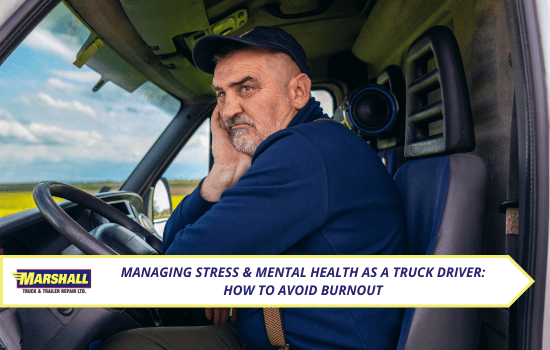Truck drivers face unique challenges on the road, making stress and burnout common concerns. Managing mental health effectively is essential for maintaining well-being and staying resilient in the demanding trucking industry.
Stress-Free Trucking: Essential Tips for Managing Mental Health and Avoiding Burnout
 Truck driving is one of the most demanding professions, requiring long hours on the road, time away from home, and constant pressure to meet deadlines. As essential as it is, the lifestyle can also be overwhelming, and the toll it takes on mental health is often overlooked. Mental health struggles such as stress and burnout are real concerns for truck drivers, but with the right strategies, you can manage stress and maintain a healthy mindset. Here’s how to avoid burnout and take care of your mental well-being as a truck driver.
Truck driving is one of the most demanding professions, requiring long hours on the road, time away from home, and constant pressure to meet deadlines. As essential as it is, the lifestyle can also be overwhelming, and the toll it takes on mental health is often overlooked. Mental health struggles such as stress and burnout are real concerns for truck drivers, but with the right strategies, you can manage stress and maintain a healthy mindset. Here’s how to avoid burnout and take care of your mental well-being as a truck driver.
1. Recognize the Signs of Stress and Burnout
The first step in managing mental health is recognizing when stress is becoming overwhelming. Symptoms of burnout and stress can include:
- Chronic fatigue;
- Increased irritability;
- Trouble sleeping;
- Feelings of anxiety or depression;
- Difficulty concentrating.
2. Prioritize Sleep and Rest
Getting quality rest is essential for both physical and mental health. Long hours on the road can interfere with sleep, but it’s important to prioritize rest when possible. Aim for consistent sleep patterns and use your off-duty hours to recharge.
-
Find rest areas where you feel safe and comfortable.
-
Avoid caffeine or heavy meals right before bedtime.
-
Create a calming bedtime routine to help signal your body to wind down.
3. Stay Active and Fit
Physical health and mental health are deeply connected. Long hours spent sitting behind the wheel can contribute to physical discomfort and stress. Incorporating regular physical activity into your routine can help release tension and improve mood.
-
Stretch regularly to avoid stiffness and discomfort.
-
Find opportunities to walk or move around during breaks.
-
Consider simple exercises that can be done in or around your truck.
4. Fuel Your Body with Healthy Food Choices
What you eat can significantly impact how you feel. Fueling your body with the right nutrients helps to stabilize energy levels, improve mood, and reduce stress. Make an effort to eat balanced meals, even while on the road.
-
Choose healthier snack options such as nuts, fruit, or yogurt over sugary, processed foods.
-
Plan meals ahead of time to avoid relying on fast food.
-
Stay hydrated throughout the day.
5. Maintain Social Connections
Being on the road can feel isolating, but staying connected to friends, family, and peers is essential for mental health. Social support provides emotional relief and helps reduce the feelings of loneliness that can contribute to burnout.
- Regularly check in with loved ones via phone or video calls.
- Join online trucker communities for advice, support, and camaraderie.
- If you’re feeling isolated, reach out to someone you trust to talk about how you're feeling.
The simple act of talking to someone can help release built-up stress and provide a sense of connection while away from home.
6. Practice Stress-Relief Techniques
Taking moments to unwind and practice relaxation techniques can help manage stress on the road. Mindfulness practices can be easily incorporated into your driving routine to reduce tension.
-
Try deep breathing exercises while driving or at rest stops.
-
Listen to calming music or podcasts that help you relax.
-
Consider guided meditation or mindfulness apps during breaks.
By making time for stress-relief techniques, you can maintain a calm and focused mindset throughout your day.
7. Know When to Seek Help
If you feel that your mental health is becoming too much to handle, it’s important to seek professional help. There’s no shame in reaching out for support, whether it’s through therapy, counselling, or talking to your employer about stress management resources.
Many trucking companies offer Employee Assistance Programs (EAPs), which provide confidential support and counselling. Don’t hesitate to take advantage of these services if they are available to you.
Being a truck driver requires immense resilience and focus, but managing your mental health should be just as important as maintaining your vehicle. By recognizing the signs of stress, taking care of your body and mind, and reaching out for support when needed, you can prevent burnout and continue to drive with a clear, healthy mind. Your well-being is just as vital as your job performance, and with the right strategies, you can thrive on the road.
